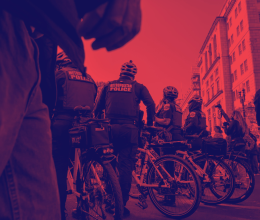Dear D.C. Council Members,
The ACLU-D.C. commends the Council for considering Bill 24-320, the “Comprehensive Policing and Justice Reform Amendment Act of 2022,” which is expected to go up for a first vote on Tuesday, December 6, 2022.
Although we are generally supportive of the bill’s passage, the ACLU-DC has identified the following areas where the legislation needs to be strengthened through amendments in order to realize the Council’s intent to meaningfully increase accountability over police practices in the District.
Restrictions on Harmful Police Practices
Bill 24-320 places restrictions on the use of chemical and non-lethal weapons at First Amendment rallies. However, the bill falls short of an outright ban on chemical weapons. These weapons prevent people from exercising their First Amendment rights and have in the recent past been used excessively and indiscriminately by law enforcement. The ACLU-D.C. therefore supports a total ban on the use of these harmful tactics and urges the Council to pass an amendment banning the use of chemical weapons at First Amendment rallies and beyond.
Critically, there is no way to enforce most of the existing provisions restricting the use of chemical and non-lethal weapons because Bill 24-320 does not include a private right of action for these provisions. Absent a cause of action, those harmed by officers’ illegal use of these tactics will have little recourse. As currently written, most of the provisions under this section will remain largely unenforceable. The Council should amend the bill to include a private right of action for those harmed by the use of chemical and non-lethal weapons at First Amendment rallies.
Subtitle F of Bill 24-320 places limitations on consent searches by establishing an affirmative consent standard. This would require officers to issue Miranda-like warnings before conducting a consent search. While we have supported this position in the past, further research suggests that the best course of action would be a complete prohibition on the use of consent searches in all instances, especially in situations where police are interacting with young people. The power imbalance between officers and members of the public often forces individuals to inadvertently waive their rights. Young people are particularly susceptible to the type of coercion that officers employ with affirmative consent, as they are both impressionable and fearful of—even conditioned to obey—authority figures. The risks are even greater for Black and brown youth, who are disproportionately subjected to harassment and over-policing. The Council should prohibit all consent searches as recommended by the Police Reform Commission and as recommended for children in Bill 24-306, the “Youth Rights Amendment Act of 2021.”
Transparency Over Police Misconduct
We are pleased to see that Bill 24-320 expands access to officer records by establishing an officer misconduct database and clarifying that the personal privacy exemption under D.C.’s FOIA law doesn’t apply to police disciplinary records (with some exceptions). However, by only including sustained allegations, the database will not catch the full picture of officer misconduct. In the current system, only a small number of cases reach the point where they are sustained, which is not always indicative of whether misconduct occurred. One simple way to provide a fuller picture of officer behavior and ensure that officers who have repeated complaints against them are flagged for further review is for the database to include, in addition to sustained allegations, the total number of distinct complaints filed against an officer.
One significant impediment to transparency that Bill 24-320 fails to address is the Metropolitan Police Department’s (MPD) practice of charging exorbitant fees and denying fee-waivers for FOIA requests. We know about this significant barrier to public transparency all too well: on several occasions, the ACLU-D.C. has sought fee waivers only to be denied and face bills for $1,000 or more. The Council should amend D.C.’s FOIA law to remove agency discretion to deny fee-waivers when records are sought in the public interest. Doing so would also better align D.C.’s FOIA law with the federal FOIA. Additionally, the Council should also conduct a review of FOIA fees charged by all District entities, especially MPD.
Holding Police Accountable for Misconduct
While we support Bill 24-320's removal of discipline from the collective bargaining process, we believe disciplinary decisions for serious misconduct should be removed from MPD, DC Housing Authority Police Department (DCHAPD), and Office of the Inspector General (for personnel authorized to conduct felony investigations) altogether. The Council should ensure that a neutral third party reviews all disciplinary decisions for serious misconduct, rather than putting it into the hands of the Police Chief, who has an incentive to shield officers from accountability. Police should not be entrusted to hold themselves accountable.
Lastly, Bill 24-320 increases OPC’s authority to recommend discipline for D.C. police officers in instances where they have been found to commit wrongdoing, but it fails to clarify that OPC’s recommendations would be binding on the respective law enforcement agencies. We recommend the Council amend the legislation to clarify that agencies must follow the disciplinary recommendations made by OPC in order to make this provision effective.
Conclusion
Improving public safety in the District involves restricting harmful police practices, creating more transparency around police misconduct, and holding police accountable for their misconduct. ACLU-D.C. recommends that the Council implement our suggestions through amendments to Bill 24-320 at its first vote on Tuesday, December 6th. We stand ready to work with you on legislative language to amend the bill. If you have any questions, please contact Ahoefa Ananouko, Policy Associate, at [email protected] and Melissa Wasser, Policy Counsel, at [email protected].



